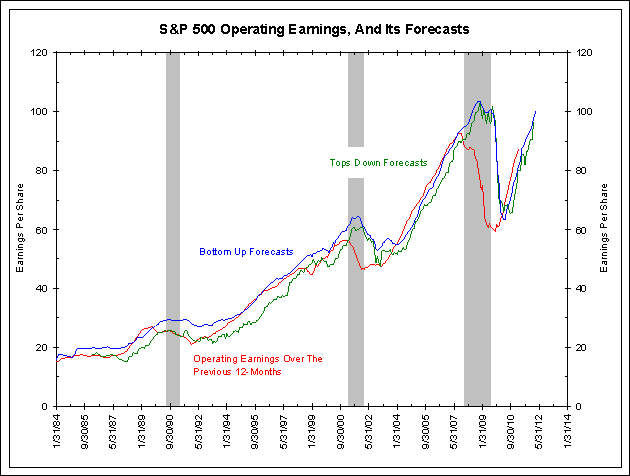Credit Writedowns – Bianco: An 1100 S&P would look expensive if we have a recession
Economists are telling us that the economy is decelerating rather quickly. What does that mean for stocks, in either a recession or no-recession scenario? Jim Bianco was on Bloomberg Television yesterday with some insightful comments about stock valuations and economic cycles. Bianco told Bloomberg that he believes the likelihood of recession in the US is greater than 50%. To his mind, this means getting defensive. What I found most compelling in his analysis was how he looked at consensus earnings estimates and what impact this could have on valuations.He said:Valuations look very good under one assumption – that the current estimate for earnings is going to become reality. If we have a recession or anything close to recession, history shows us that Wall Street can not only miss earnings when we have a recession, but be way off on earnings; 25%, 30%, 35% is not uncommon of a miss when we have a recession in earnings. So all of a sudden, an 1100 or 1150 S&P that looks cheap now might be expensive if we have a 30% hit on earnings.
Credit Writedowns – On recessions and earnings volatility
After posting the Jim Bianco article on getting defensive, I traded e-mails with Jim on recessions and earnings volatility. Here’s what he had to say after I showed him the article:
I saw it, the link Tyler had in the comment section from the FT was equally interesting. Mackintosh said the same thing, namely if earnings fall 40% over estimates, like they did in 2008, the market is overvalued.
I would finally add that I think the market knows all this. It understands if we miss a recession then stocks are cheap as they can hold the cyclical earnings peak. If we have a recession, then stock are expensive. This is why the major averages gyrate around with huge volatility, the extreme binary outcomes feed into this belief.
The link Jim is referring to was a 5 minute clip from FT investment editor James Mackintosh from late August in which Mackintosh talks about the forward P/E ratio. While I never look at forward P/Es because they are misleading, Mackintosh is on to something in that video. Stocks are not cheap if you use a Shiller P/E which is a rolling average of past earnings. And this has been true since 2009.
Comment
The first chart below shows S&P operating earnings (red line) and their 12-month forward forecasts shifted ahead 12 months to the month they are predicted to happen. The second chart shows the difference between the forecasts and actual releases. The shaded areas highlight official recessions.
Wall Street is one of the few places where practice does not make perfect. Notice that every subsequent recession sees larger earnings error rates than the previous recession.
During the 1990/1991 recession, top-down forecasters (strategists) were too optimistic by 10%. Bottom-up forecasters (adding up the 500 company forecasts) were too optimistic by 25%.
During the 2000/2001 recession, top-down forecasters were too optimistic by 25%. Bottom-up forecasters were too optimistic by 23%.
During the 2007/2009 “Great Recession”, top-down forecasters were too optimistic by 39.6%. Bottom-up forecasters were too optimistic by 40%.
Also notice the difference between the top-down and bottom-up forecasts. Current strategists are getting significantly worse at predicting earnings than their 1980s and 1990s counterparts.
What Does This Mean?
If the economy goes into recession, earnings forecasts are not 10% to 12% too high. Instead they might be 20% to 40% too high. In other words, if the economy goes into recession, the earnings forecasts are horribly wrong. They might be so wrong that one can make the case that the market might be overvalued. We believe this is part of what is bothering the markets, the epiphany that the economy is much weaker than expected and a recession will blow a hole in earnings forecasts to the point that the market might not be cheap anymore.
Source:
James Bianco, Chief Executive Officer, Bianco Research, LLC, September 14, 2011




What's been said:
Discussions found on the web: